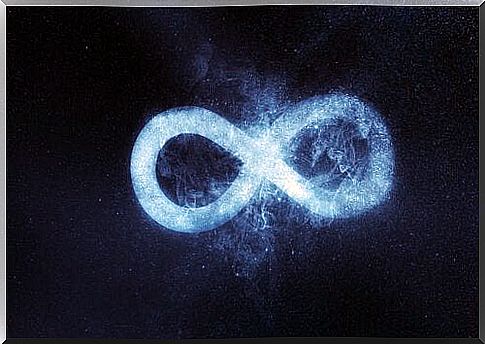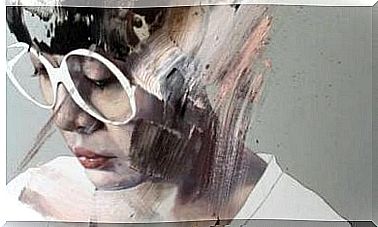Apeirophobia: The Fear Of Infinity

Apeirophobia, or the fear of infinity, is a very peculiar phobia that very few people are aware of. However, before explaining what this phobia is, let’s briefly discuss what a phobia is.
A phobia is an intense and irrational fear of certain situations, objects, people or activities. The DSM-5 classifies it as an anxiety disorder. One of the main characteristics of a phobia is the desire to avoid or escape what one fears and to reduce the discomfort it causes.
In this sense, it is important to distinguish between phobias and fears. To understand the difference, we need to look at the intensity of the fear and the consequences that follow.
With this in mind, we need to look at the extent to which a fear affects a person’s life. In addition, it is a phobia if it intensifies and causes avoidant behavior.
Although the onset of a phobia usually has no specific cause, there are some genetic, social, or learned factors that may be related.
Traumatic experiences during childhood can also have an influence. For example, if a child sees a documentary about how black holes absorb stars in the universe, he may develop a deep fear of being absorbed by a black hole himself.
What is apeirophobia?
Apeirophobia is the term used to refer to the excessive and irrational fear of grasping the concept of infinity and eternity.
This fear causes great physical discomfort and can manifest itself at any time of the day or night. An intrusive thought about the infinite can trigger a severe anxiety attack.
So the idea of being in touch with infinity can be very dizzying. People with this phobia avoid situations or factors that can stimulate the feeling of infinity.
For example, the sky, the ocean or endless numerical sequences. In addition, they also avoid introspective activities and never try to imagine eternity.
People who suffer from apeirophobia often try to live their lives as predictably as possible. They do this to keep their obsessive thoughts about the infinite or the universe at bay.

Causes
Like all phobias, apeirophobia has no specific cause. Some experts have linked genetic, environmental, social and natural factors to it. For example, Sigmund Freud, the father of psychoanalysis, was interested in phobias. According to him, phobias generally had two phases:
- First phase: There is an event that causes great fear. At the same time, the person who develops the phobia takes an object from the outside world (such as spiders, horses, cars, or infinity) and sees it as dangerous or a threat.
- Second stage: The person begins to defend himself in every possible way to avoid contact with this danger or threat.
From a biological perspective , another possible explanation of phobias combines factors such as genetics and brain chemistry. If these factors coexist with life experiences, the person may develop a specific phobia, such as apeirophobia.
How to identify a phobic reaction
A phobic reaction begins when a person is exposed to the object or situation that he has associated with danger. In some cases, this reaction can even lead to a panic attack. The most relevant features of a phobic reaction are:
- On a physiological level. Abnormally fast heart rate, sweating, redness, paleness, upset stomach, dry mouth, and trouble breathing, among others.
- On a motor level. Trembling voice, facial grimacing, strange movement of limbs, rigidity and immediate evasive behavior.
- On a cognitive level. These include negative interpretation of the situation, doubts about one’s own ability to cope with the situation and fear of dying.
Characteristics of apeirophobia
The main features of apeirophobia are:
- An irrational and disproportionate fear of understanding the concept of infinity and eternity.
- The realization that the concepts of infinity, universe and eternity are beyond their comprehension. This produces some anxiety that makes it difficult to concentrate and carry out their daily activities.
- A great need to keep everything under control and in perfect working order. This masquerades as an attempt not to confront the concepts of eternity, infinity, and the immensity of the universe.
- The people who suffer from it recognize it as an irrational fear but cannot control it.
- A strong urge to live their lives as predictably as possible.
- They often have nightmares about falling infinitely.
- Intrusive and negative thoughts about the infinite during moments of introspection, relaxation or imagination. Because of this, they tend to avoid these kinds of situations.

How to know if you have apeirophobia
- You can not explain or rationalize your fear of infinity.
- Even if you wanted to, you have no control over it.
- Your response to this fear is to avoid any situation that might have to do with the infinite.
- This fear of infinity lasts a long time.
- Your fear of the concept of infinity keeps you from adapting to your environment.
Treatments for Apeirophobia
Like all phobic disorders, a specialist, such as a psychologist or psychiatrist, must diagnose and treat apeirophobia. They are also the only ones qualified to determine what kind of treatment is needed in each specific case.
Phobias are usually treated with psychotherapy. Only in the most extreme cases, when patients cannot function properly, will psychiatrists prescribe medication in addition to psychotherapy. A psychiatrist must evaluate the patient before prescribing medication.
Apeirophobia can cause a lot of discomfort. For this reason, it is important to see a specialist if your fear is holding you back from living a happy life. Avoidant and obsessive behavior takes a lot of energy and can become exhausting and barely manageable.









